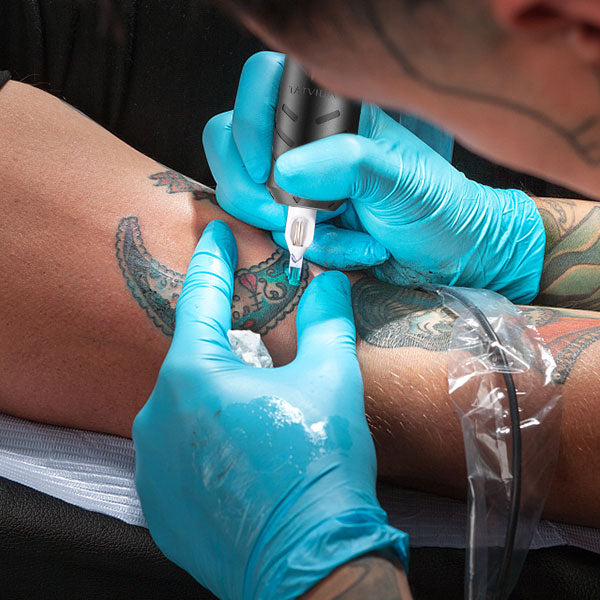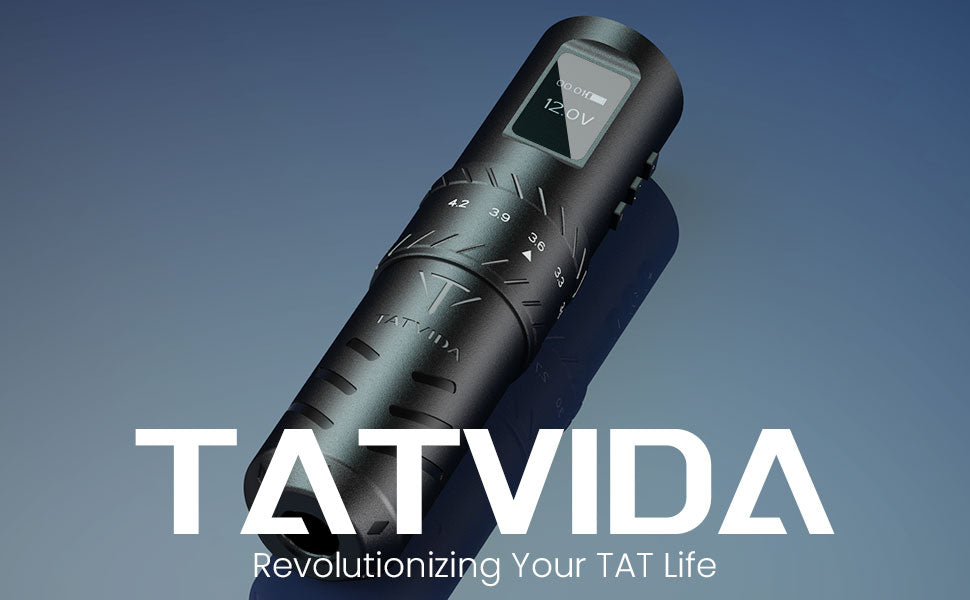Everything You Need to Know About Wireless Tattoo Machine

Introduction
For decades, tattoo artists have been tethered to outlets by required cables-confining creativity within a fixed radius of cord length. Now, with the advancement of tattoo technology, wireless tattoo machines liberate artists by integrating battery-powered operations straight into the artist's hand. Unbound mobility and efficient versatility were previously impossible with corded tools. This guide will tackle common questions those new and experienced in tattooing should understand before adopting this emerging technology.
What Is a Wireless Tattoo Machine?
At its core, a wireless tattoo machine utilizes a built-in battery-powered motor to drive ink into skin accurately and efficiently-no wall outlets necessary. While eliminating restrictive cables, these specialized tools uphold the precision demanded by industry leaders.
Wireless tattoo machines have evolved aggressively in recent years from crude initial implementations to modern examples rivaling the capabilities of top-tier wired tattoo guns. Freed from cables, artists can easily pack up and bring reliable tools to alternative environments-enabling mobile tattoo ventures or more flexibility in studio layouts. Customers even comment on a subtle boost in artistic confidence when not tethered tightly to a single location.

Types of Wireless Tattoo Machines
Wireless tattoo machines adopt several forms, each better suited to particular needs and comfort levels. These include:
- Rotary Style: Smooth and virtually silent rotary operation makes this machine style exceptionally versatile for shading and lining alike. Adjustable options provide precision fine-tuning capabilities. Rotary wireless tools have become a popular jack-of-all-trades.
- Pen Style: Resembling writing instruments, and pen-style wireless tattoo machines promote great mobility, reach, and control. The compact design however limits ruggedness over higher-workload alternatives. Pen-style serves well as a secondary travel or detail-work machine.
- All-in-One: Convenient and minimalist, all-in-one wireless tattoo machines integrate the power supply directly into the handheld unit. This further reduces setup needs at the cost of customization flexibility. Great for hobbyists or traveling light.
- Modular Design: Modular wireless tools split components like the power supply and motor into separate housings, often linked by cables. Although not strictly "wireless", this middle-ground offers expanded customization of individual pieces to suit unique needs.
How Does a Wireless Tattoo Machine Work?
Wireless tattoo machines are revolutionizing the industry with their sleek design and advanced mechanics, notably through the integration of the PULSE-1 Motor. This state-of-the-art motor replaces traditional electromagnetic coils and electric motors, delivering consistent power to drive tattoo needles with precision hundreds of times per second.
The rechargeable and replaceable battery feeds electricity to the motor or coils, activating needle movement once the artist depresses the machine's power button. Additional dials, switches, or buttons allow adjusting needle depth, and voltage, and even controlling integrated lights. When not in use, the machine charges via a Type-C cable.
Well-designed wireless machines retain power, precision, and durability comparable to premier wired models-though they require periodic battery charging. Modern innovations such as on-LED display battery monitoring and magnetic connectors further improve reliability and usability over pioneering attempts.

How Long Do Wireless Tattoo Machines Last?
Wireless tattoo machine battery life varies based on total capacity and settings. Average charge lasts:
- 2 to 6 hours of continual tattooing per charge
- Up to 1-2 weeks of light or periodic use
Adding to this, high-quality devices are designed to last even longer:
- A robust charging period of 2-3 hours can yield an impressive 12 hours of continuous operation.
Allowing batteries to drain completely before charging prolongs the overall lifespan. Well-maintained lithium batteries endure 500 or more complete charge cycles. Avoiding exposure to extreme temperatures and limiting drops also preserves longevity. Advancements now enable replacing just the battery rather than the entire machine when power wanes over years of heavy use.
Are Wireless Tattoo Machines Better?
Wireless models provide compelling advantages balanced by a few tradeoffs:
1. Benefits of Wireless
- 360-degree movement unhindered by wires
- Faster set up, pack down in changing venues
- More flexible studio layout options
- Lightweight feel improves control and reach
2. Downsides of Wireless
- Generally 20-50% costlier than wired
- Frequent charging needs
- Higher initial learning curve
For traveling artists or those valuing maximum mobility during sessions, choosing wireless equates to greater creative freedom and efficiency. Yet traditional corded machines still hold merits in cost and familiarity-making personal preferences and work style deciding factors.
Top performers like Tatvida now bridge the gap to compete head-to-head with acclaimed wired devices in precision, power, and reliability at a reasonable expense. This makes the wireless format more appealing than ever across experience levels.

How to Choose the Best Wireless Tattoo Machine?
While hype inevitably gravitates toward trending brand names each season, identifying the best wireless tattoo machine boils down to 3 personalized essentials:
- Ergonomic Comfort:An extension of the artist's own hand, the machine should promote painless grip across prolonged sessions courtesy of weighted balance and finger-hugging curves right where they count.
- Battery Benchmark: With the 2400mAh setting a high standard for reliable battery power, top-tier wireless machines boast this substantial capacity, supporting long-term work with consistent output. Additionally, quick-charging capabilities can swiftly bring the battery back to life, readying the machine for hours more of tattooing after just a short charge.
- Stroke Versatility: The best wireless tattoo machines give artists the ability to choose from multiple stroke lengths - from 2.4mm up to 4.2mm. This range is perfect for all kinds of tattoo work, whether it's detailed lining, solid color filling, or soft shading. Easy stroke adjustments mean you can switch between different tattoo techniques smoothly and get just the right touch for each piece of art.
When shopping for a wireless tattoo machine, focus on these essential features rather than getting swayed by promotions or popular brands. Consider what will best support your artistic style and enhance your tattooing process.
Conclusion
Going wireless opens up a whole new world of creativity, but it also means we have to think about how long the battery will last. As wireless tattoo machines get better and more reliable, we worry less about whether they'll work well or not-especially with leading companies like Tatvida making super tough machines that are as good as the fancy equipment in high-end studios. If you're ready to break free from the hassle of wires, there's an exciting new space for you to explore and create in.
FAQs About Wireless Tattoo Machine
Q: Are wireless tattoo machines heavy?
A: Wireless tattoo machines are designed to be compact and often weigh only slightly more than their corded counterparts due to the built-in battery.
Q: Can I adjust the voltage on a wireless tattoo machine?
Yes, most wireless tattoo machines come with an adjustable voltage range, allowing you to control the speed and force of the needle.
Q: Is a wireless tattoo machine suitable for beginners?
A: Wireless machines can be user-friendly and may offer a simpler setup process which can be advantageous for beginners. However, they might be more expensive than traditional setups.
Q: How much does a wireless tattoo machine cost?
A: Prices vary greatly based on brand, quality, and features; they can range from $200 to over $1000.
Q: How do you maintain a wireless tattoo machine?
A: Proper maintenance includes regular cleaning, lubrication, and ensuring that the battery is adequately charged before each use. It's also essential to follow manufacturer recommendations for storage and care to prolong the lifespan of the machine.
Q: Are there specific types of tattoos or artistic techniques that are particularly well-suited for wireless tattoo machines?
A: Wireless tattoo machines are versatile and suitable for various tattooing styles, including traditional, realism, blackwork, and illustrative designs. Additionally, they are well-suited for intricate linework and fine details due to the enhanced maneuverability they provide.



